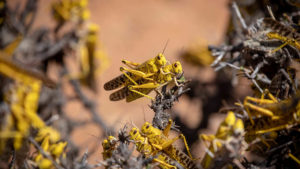 FAO is further scaling up its activities to fight the Desert Locust upsurge in East Africa with a $10 million loan approved by the United Nations’ Central Emergency Response Fund (CERF).
FAO is further scaling up its activities to fight the Desert Locust upsurge in East Africa with a $10 million loan approved by the United Nations’ Central Emergency Response Fund (CERF).
This loan will supplement the $10 million grant that CERF contributed to FAO in January to fight the outbreak which is threatening to provoke a humanitarian emergency in the region.
The CERF loan will be used to further scale up the desert locust control operations through the procurement of pesticides, hiring of helicopters and aircraft, the purchase of vehicles with spray equipment and the conduct of environmental impact assessments in the worst affected countries – Ethiopia, Kenya and Somalia.
FAO’s Desert Locust Information Service says it is the worst outbreak to strike Ethiopia and Somalia for 25 years and the worst infestation that Kenya has experienced in 70 years. Djibouti and Eritrea have also been affected. Swarms have been reported in Bahrain, the Republic of Iran, Iraq, Kuwait, Oman, Saudi Arabia, Sudan, Qatar, the United Arab Emirates and Yemen, as well as India and Pakistan.
The situation is extremely alarming in East Africa, a region where 20 million people are already considered food insecure. There, the swarms have laid eggs and in a few weeks’ time, these will mature, and start to eat crops – right at the start of the region’s main agricultural season.
Pasture and croplands have already suffered damage in Djibouti, Eritrea, Ethiopia, Kenya and Somalia, and there are potentially severe consequences for the region where millions rely on agriculture and livestock rearing for their survival.
With the growing spread of the locust outbreak, FAO recently raised its appeal to $153 million to assist the countries that have been impacted – Djibouti, Eritrea, Ethiopia, Kenya, Somalia, South Sudan, Uganda, the United Republic of Tanzania. This also includes $15.2 million for the potential threat posed by the pests to the Sudan and Yemen. So far around $107 million have been pledged or received from donors, so there is urgent need to fill the gap.
aA
FAO is already on the ground working with governments, and other partners to fight the upsurge. Locust experts and other personnel have been deployed to support governments with their surveillance and coordination. They are also providing technical advice and assistance with the procurement of supplies and equipment for aerial and ground operations.
